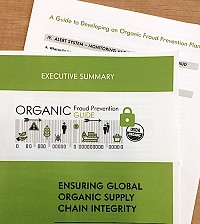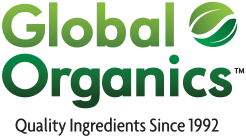Organic Fraud Prevention
04.23.2019 | Author: Global Organics | Category: Organic & Sustainability, Quality & Certifications
The Organic Trade Association (OTA) recently launched Organic Fraud Prevention Solutions, an industry-wide program aimed at strengthening the integrity of the organic supply chain. The program requires training, organic fraud vulnerability assessments and the development of organic fraud prevention plans. This voluntary program is a quality assurance initiative and not a certification or verification program or a product label.
 OTA is now calling upon OTA members to enroll in the program, as the ultimate goal is for all companies to fight fraud to assure consumers that they can trust the organic label. (enrollment for non-OTA members will start in 2020) As of the launch date there were 10 companies, including Global Organics, pre-enrolled in the program. As of this article there are 26 early adopters!
OTA is now calling upon OTA members to enroll in the program, as the ultimate goal is for all companies to fight fraud to assure consumers that they can trust the organic label. (enrollment for non-OTA members will start in 2020) As of the launch date there were 10 companies, including Global Organics, pre-enrolled in the program. As of this article there are 26 early adopters!
The OTA’s Executive Summary has everything you need to know before enrolling in the program.
Here’s some quick information about the program and how our involvement to date has made our quality assurance program even more robust.
The Backstory
Why does organic fraud occur? Demand for organic product still exceeds supply for many goods, which contributes to higher prices. Since there is not enough supply from organic farms to meet demand, opportunistic companies take advantage of the complicated organic supply chain and slip fraudulent product into their shipments to make a quick buck.
In the U.S. last year, three farmers pleaded guilty to deliberately marketing non-organic corn and soybeans as certified organic as part of a multi-million-dollar fraud scheme. Fraud in crops grown in the U.S. is believed to be a much smaller problem than imported crops.
You may remember investigations two years ago that revealed imported products labeled as organic when they weren’t. The most publicized incident involved millions of pounds of non-organic soybeans obtaining an organic label somewhere in transit between Eastern Europe and California. The organic industry was outraged, and OTA put significant time and resources towards solutions that would help prevent and mitigate fraud inside and outside of the U.S. In May 2017 the OTA convened a Global Organic Supply Chain Integrity (GOSCI) task force of 48-member companies to develop a best practices guide.
Our Involvement in the GOSCI Task Force and Pilot Project
Since importing organic ingredients is our business, and because we have identified companies offering us fraudulent product in the past, members of Global Organics QA team (Mark Novak, Cynthia Morphet and Kristina Underthun) quickly volunteered for OTA’s GOSCI task force to share our knowledge and to determine if we had any blind spots in our system.
[If you want to read more about Global Organics’ unique approach to quality and food safety click here.
In June of 2018 the guide was completed, and Global Organics was one of 13 companies that volunteered to test the guide. From the outset of GOSCI through the Pilot Project, we participated in over 60 conference calls and 3 in-person group meetings.
What We Learned
Mark Novak, our Director of Operations, who oversees the Quality department, commented “Our involvement in GOSCI and the pilot project validated that our QA practices assess supply chain integrity very well. We collect and review supplier documentation, assess their programs, audit their operations and ensure product testing to validate claims.”
He also noted, “We have strong transparent relationships with our processor partners which allows us to be a part of their continuous improvement programs. Testing the guide confirmed and reinforced the need for high visibility from farmer to processor in the supply chain. In our process, we will reinforce visiting farms and auditing the transport of raw materials, to confirm there is no co-mingling of organic and non-organic crops.”
“Another key point for us was the importance of assessing risk. While GOSCI wasn’t the first initiative underscoring the importance of risk assessment, the guide repeatedly hammered on its importance” said Novak.
The pilot project also reinforced for us that we must maintain our rigorous testing programs for pesticides and contamination at accredited third-party labs.
Action - Enroll Now
The major take-away for us - vigilance is crucial to fight fraud in the organic supply chain. Fraud not only impacts credibility of the NOP Organic Seal, it also can have a huge impact on a company’s brand found to be using a fraudulently labeled ingredient. Purchasers have to be especially careful in doing due-diligence on imported organic ingredients that goes far beyond a document trail or third-party audit. Working with suppliers that can mitigate risk in the organic supply chain and validate truly organic products is critical.
We encourage growers, processors, importers, distributors and other members of OTA to enroll in the Organic Fraud Prevention Solutions program. The more people involved, the stronger the organic supply chain will be.
If you have questions about our organic ingredients, please contact your Global Organics Account Manager or email info@global-organics.com.


